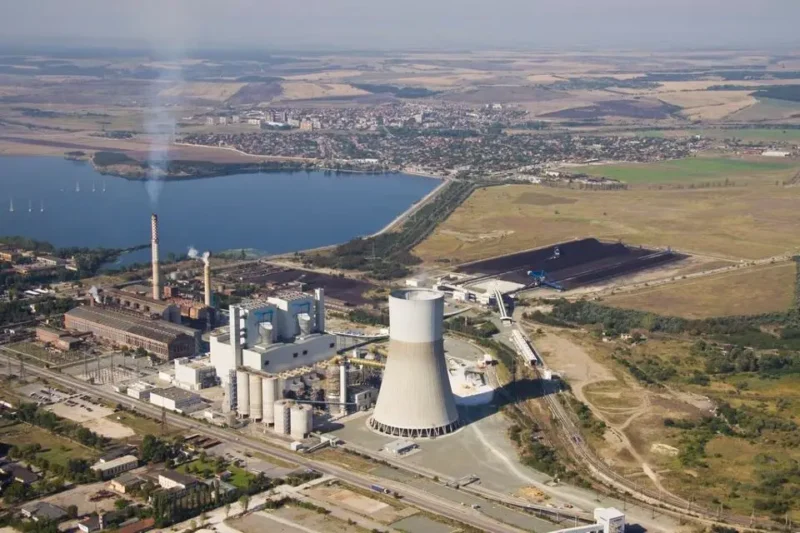
Dimitar Sabev is an economist at the Economic Research Institute of the Bulgarian Academy of Sciences. He holds a PhD from the University of National and World Economy in Sofia, where he defended a thesis on post-growth economics (later turned into a best-selling book). He is also an influential economic analyst, has experience as an economic journalist and has his own blog, which offers a deeper understanding of Bulgarian social, economic and environmental issues – Bodil (Thorn).
Found in Transition – Cross-border Talks’ new project on Just Transition – spoke to Dimitar Sabev about the local realities in Bulgaria’s main coal-producing region – Stara Zagora. We discussed the structure of the Bulgarian energy industry, the possible regional futures after the coal phase-out, and the vested interests in the Bulgarian energy sector that want to maintain the status quo for as long as possible – and then turn Big Coal into Big Solar.
What are the most important facts to be known about just transition in Bulgaria?
The green transition would be an enormous challenge for the Bulgarian economy and society. The European Commission acknowledged in its working papers that Bulgaria would be among the most affected countries, yet our government takes no preemptive measures.
The fact is that 43% of the gross electricity produced in Bulgaria in 2022 came from the burning of coal, mostly lignite – while the EU average was only 15.9%. Moreover, all European countries decreased their coal production between 1990 and 2022 – except for Bulgaria, which scored a 5.5% growth. The Bulgarian energy system is truly coal-dependent.
The most obvious consequence of this is deteriorating public health. Scientific papers are certain that the minimal number of Bulgarians who lose their lives prematurely due to air pollution provoked by coal-burning power plants is roughly 500 per annum. This is the most conservative estimation; more probably, the real number goes somewhere around 1,000 or 2,000.
Yet the central and local authorities are not disturbed by this fact. Local people who work and live there also neglect the elevated morbidity and mortality because they have their salaries. An average monthly wage in the coal sector is approximately 2,000 euros, which is a substantial amount for Bulgaria. People in the coal regions are aware that they may die prematurely – many men would not live beyond 60. But we are happy to sacrifice ourselves to provide for our families. We Bulgarians are the heroes of suffering.
The same attitude prevails in the communities where copper and gold ores are mined. Salaries are high, but at the expense of workers’ health. Yet workers are willing to trade their health for the future of their children – their higher salaries can help the children move out of the mining regions.
That is why the people of Stara Zagora, Radnevo, Galabovo – the communities of the Maritsa East energy complex – want to preserve and even expand the coal sector.
What else is important to know about the situation in and around Maritsa East?
The second key aspect is the ownership structure of the production facilities. There is no single entity in Maritsa East, but a complex of very different types of companies.
The coal mines, which employ about 6,000 people, are state-owned. The largest thermal power plant in the complex, with a capacity of around 1,600 megawatts, is also state-owned. There are also two so-called American power plants with a combined capacity of 1,500 megawatts, which were modernised in the 2000s. One is now controlled by a private equity fund, and the other is owned by AES – an American energy company that is part of the S&P500 index. The fourth, at Maritsa East, is outdated and controlled by shell companies linked to the “dark energy empire” of Bulgarian businessman Hristo Kovachki. Finally, there is a fifth, smaller but older and dirtier power station at Dimitrovgrad. So the Maritsa East mines supply lignite to five entities. They also export a small part of their production, about 5%, to Serbia.
Another key element of this energy complex is the maintenance business. Burning lignite is a dirty production process that produces a lot of sulphur, which quickly degrades production equipment. Power plants depend on timely delivery of spare parts and repair work. This repair business is even murkier than the previous one.
To sum up, the Bulgarian state has a huge stake in Maritsa East, as do a large American company, private equity investors, the aforementioned opaque businessman and some even lesser-known business structures. What we end up with is a polycentric and extremely resilient ecosystem.
Then there are the other players – the local authorities, the local people and the trade unions – who have their own interests. The miners are well organised. If coal production were to cease at some point in the future, the unions would lose most of their membership base. The unions therefore have a strong interest in preventing or at least delaying the energy transition in Bulgaria.
For many years, the state power plant has been producing electricity at a loss. Before the war in Ukraine, it was running up debts of tens or hundreds of millions of euros every year, mainly because of the high price of carbon emission permits. The state energy holding company had to transfer money directly to the ailing plant. In the end, the power plant accumulated a debt to the state of about one billion Bulgarian leva. (I am only talking about the state-owned power plant here – a different transfer scheme was envisaged for the private producers).
In 2021, I calculated that it would be economically more feasible for the state to just pay the salaries of the workers in the state-owned structures in Maritsa East without sending them to work, than to transfer funds to cover the losses of their production.
How has the war in Ukraine affected the coal mining regions, particularly Stara Zagora?
There was a spike in energy prices when the war broke out in Ukraine. This was a global impact – compounded by some national speculation. Some sources (including employers’ organisations) believe that Hristo Kovachki was involved. Thanks to much higher energy prices in 2022, the state-owned power plant somehow managed to make a profit and pay off its debts to the state. Of course, this came with a huge increase in carbon emissions.
Anyway, the wartime energy prices paid off their debts – for a while. Then their dire financial situation returned. The state regularly transfers a lot of money to them – 50 million BGN, 100 million BGN, etc. This is not done out of some kind of altruism or some kind of responsibility towards the workers concerned. It is done because of the political influence of both the opaque businessmen, the international companies, and the trade unions, which are all very well organised. All these actors are working together to protect their financial interests in Maritsa East, and they wield enormous political power.
For example, in defence of the mines and the coal-based energy sector, they organise road blockades that paralyse all national transport for days on end. When they are on the streets, they sound very reasonable. An inexperienced journalist or sociologist interviewing them might easily believe that their positions are just and then simply repeat their slogans.
But when you dig deeper, the picture becomes more complex. Saying that “these poor people will lose their jobs” brushes aside the issue of the opaque ownership structure of Bulgarian coal power and the fact that at least 500 people die prematurely every year. Look at the mortality rate in the coal region – it is up to 2.5 per cent a year! People work there, but they do not want their children to live there. These regions are losing population massively.
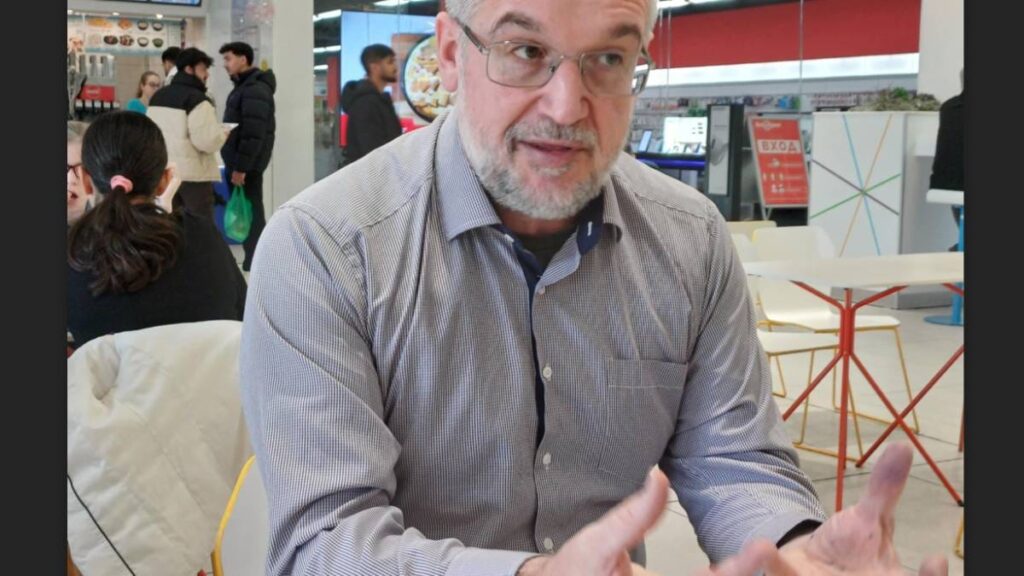
Dimitar Sabev, photo by Vladimir Mitev
But the need to phase out coal is not new. Nor is the concept of industrial transition (which should also be a just transition), ‘redirecting’ former miners into alternative industries and services, a recent development. Why is the choice still presented as between coal mining – and nothing?
After the Paris Agreement in 2015, it was clear that something had to be done about the future of Maritsa East. Nine years ago, we could have started planning how to replace jobs and promote entrepreneurship in these regions. Regional industrial parks, microcredit lines – all this could have been done.
There are hundreds of engineers working in thermal power plants. These people are valuable human capital that could be employed in other manufacturing industries or supported to create their own innovative green energy start-ups. Unfortunately, this is not politically feasible. Therefore, I expect the socio-economic problems in Maritsa East to escalate as we turn a blind eye to the burgeoning energy transition problems.
Nevertheless, Bulgaria has submitted territorial plans for a just transition. Didn’t they contain any kind of post-coal vision, any attempt to resolve the contradictions and expectations of businesses, trade unions and other stakeholders?
The reality is that one of the many recent Bulgarian governments submitted some documents to the European Commission. In fact, it has smuggled these territorial plans between the lines of opposing institutions and administrations.
It is telling that in January 2023, the Bulgarian Parliament officially decided to renegotiate the decarbonisation targets under the National Recovery and Resilience Plan – shortly after receiving the first tranche of €1.37 billion of EU funding under the national RRP.
A few months later, a group of pro-Russian MPs in the Bulgarian parliament went berserk and used their bodies to block other MPs’ access to the parliamentary gallery in an attempt to prevent a vote on the Roadmap to Climate Neutrality.
This is pathetic, of course. On the other hand, we have to admit that the opposing politicians and trade unions are right to say: ‘OK, we will close Maritsa East, but please give us some alternatives’. I am a green enthusiast and strongly support the end of coal-based energy. But national electricity consumption – both industrial and domestic – has to be secured somehow. How will this be done?
Do you see an alternative or not?
I have recently calculated that, in relative terms, Bulgaria is the largest exporter of electricity in the European Union. About 24% of the net domestic production of electricity in 2022 will be exported. This export, which mainly benefits intermediaries, could be redirected for internal use.
Another point is that Bulgaria is a sunny country with great potential for solar power generation. In addition, the energy efficiency of the Bulgarian industry is low and could be significantly improved. Bulgaria has some capacity for bioenergy production. We are capable of switching to various renewable energy sources – if only there was the political will.
Taking all these points into account, Bulgaria could have three, four or five major substitutes for coal. With a forward-looking government, phasing out coal could even be financially beneficial for Bulgaria. After all, we are a small and peripheral economy, and the restructuring of the old global production systems could open up new niche opportunities for us.
Politicians must be prepared to take decisions that won’t be popular with everyone.
Quite right. And in the Bulgarian case there is another problem – the trade unions. They are instilling fear by saying that the dismantling of the Maritsa East power complex would seriously affect the livelihoods of at least half a million people and that Bulgaria would be ruined without coal. This is simply not true.
About 11,000 people are directly employed in the mines and power plants. Let us assume that a similar number of people are employed in ancillary industries, such as repair shops. Perhaps a similar number of jobs have been created in the service sectors. 30-35 thousand people is a big number for Bulgaria, but it still represents only 1% of the national workforce.
Yet the trade unions claim that half a million people in southern Bulgaria will go bankrupt if any government policy affects the coal interests. They have been spreading this message for years. As a journalist, I interviewed Dimitar Manolov, the leader of the Podkrepa trade union – I witnessed him saying it. Podkrepa is one of the most vocal opponents of the energy transition.
One of the so-called American coal plants in Maritsa East – formerly owned by ContourGlobal – was recently shut down. What happened there?
It was a cash cow for Bulgarian coal power. In 2001, Ivan Kostov, a former Bulgarian prime minister, signed two long-term contracts with secret clauses. Two American companies promised to invest in coal energy production in Maritsa East, and the Bulgarian state in turn promised capacity payments. In other words, regardless of whether these plants produced electricity or not, the state was obliged to pay them a lump sum – if I am not mistaken, in the order of $150 million per year each.
In the years that followed, these plants changed hands several times. In 2011, one of the plants was bought by ContourGlobal, the global energy investment platform of Reservoir Capital Group (an American hedge fund). In 2022, ContourGlobal was sold again, and ownership of the Maritsa East plant passed to KKR, an American global investment firm.
In 2001, the inexperienced Bulgarian government promised huge capacity payments in return for some foreign investment. Thanks to these state transfers, the two American power plants were fully operational, even as the state-owned power plant piled up debt. But the capacity payments ended in 2024 for ContourGlobal (and in 2026 for the other American plant) – and it became unprofitable to burn coal. So they closed.
Shortly afterwards, there was another price spike in the electricity market. ContourGlobal quickly reopened its plant, but only for two weeks. According to the media, the owner’s long-term plan is to convert the plant into a renewable energy production facility. The National Electricity Company has a 27% stake in the plant.
To be continued – read the second part of the talk:

This interview has been prepared with the support of Journalismfund, within the scope of a broader project concerning just transition in Bulgaria, Romania, Poland and Czechia in a comparative perspective.
Subscribe to Cross-border Talks’ YouTube channel! Follow the project’s Facebook and Twitter page! And here are the podcast’s Telegram channel and its Substack newsletter!
Like our work? Donate to Cross-Border Talks or buy us a coffee!


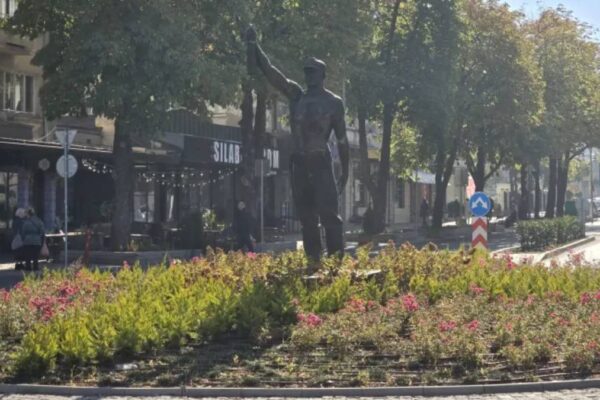

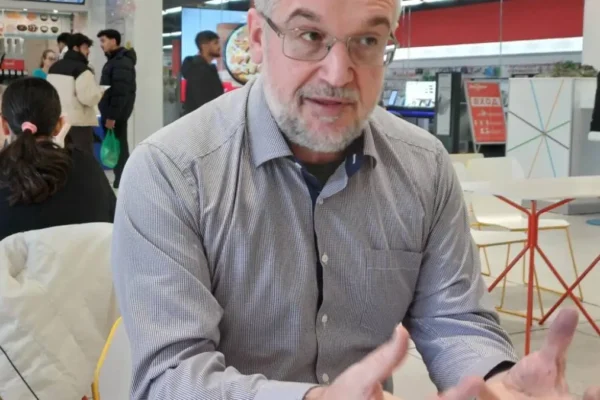
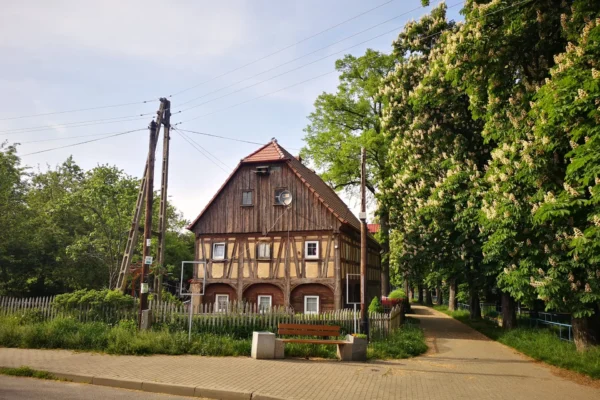
![Jiu Valley: is there a life after coal? [GALLERY]](https://www.foundintransition.eu/wp-content/uploads/2024/01/wieza-wyciagowa-i-chmury-scaled-1200x675-1-600x400.jpg)
![Jiu Valley: is there a life after coal? [GALLERY]](https://www.foundintransition.eu/wp-content/uploads/2024/01/wieza-wyciagowa-i-chmury-scaled-1200x675-1-120x120.jpg)
No comments
Dimitar Sabev: Bulgaria's green transition is not transformative. It simply replaces Big Coal with Big Solar - Cross-border Talks
24 November 2024[…] Dimitar Sabev: The heterogeneity of political and economic interests in Maritsa East carbon region c… […]